Seedlings in the desert: Did Alice Springs almost just elect a Greens mayor?

In recent years, the mayor of Mparntwe/Alice Springs in the Northern Territory has wielded disproportionate influence over national political discourse.
When federal politicians and government bureaucracies are so disconnected from the communities they supposedly serve, local government leaders' voices are given a lot of weight. If the mayor of Alice says his town 'needs' curfews, federal police and even the military to address a 'crime crisis,' a bunch of people treat that as fact rather than poorly-informed opinion, and suddenly even the Prime Minister is rearranging schedules to make an emergency flying visit to a town of barely 35 000 people.

So although Northern Territory local government elections might not seem especially significant to most of us, I was pretty excited when I saw that last Saturday (23 August), Greens candidate Asta Hill was leading the primary vote count for mayor of Alice Springs.
Asta is a criminal defence lawyer at a domestic violence legal service (also a single mum of two young kids), and has been a strong critic of the NT government's overtly racist 'tough on crime' crusade. At the time of writing, she's still ahead in the vote count for mayor, with a primary vote of 33.2%. Coming second is Eli Melky (31.6% primary vote), a long-serving right-wing councillor who is also a local real estate agent (yes, I do think being a real estate agent while serving as an elected councillor creates a significant ongoing conflict of interest).

Unlike in Queensland, the Northern Territory has Compulsory Preferential Voting for local government elections, which means voters have to number every box.
Asta's problem is that the candidate who's coming third on primary votes, Lisa-Marie Burgoyne, is Country Liberal Party-affiliated (her husband is Josh Burgoyne, an NT politician representing the northern half of Alice Springs and a current CLP government minister).
Lisa-Marie was encouraging her supporters to preference Eli Melky ahead of Asta. So if most of those voters follow that recommendation, Asta will fall just short.
On the other hand, if she doesn't get over the line in the mayoral race, she will still take a seat on the council. Territory election rules allow people to run for mayor and councillor roles simultaneously (again, not the case in Queensland) and Asta is also comfortably leading the vote count among the 25 candidates for the council.
We won't know the final result for a few more days. Whether, after preferences are allocated, Asta ends up mayor of Alice Springs, or merely one of the town's eight councillors, it's an impressive and encouraging result for the Greens, following on from her strong performance in the 2024 Northern Territory parliamentary elections. Last year, she ran for the seat of Braitling, losing to the above-mentioned CLP candidate Josh Burgoyne, but achieving a primary vote of 38.8% with a whopping positive swing of 30.1%, surging ahead of Labor.

Admittedly, we're talking about very small electorates here. The Brisbane suburb of Coorparoo alone has more voters than the entire population of Mparntwe. Fewer than 9000 residents voted in the Alice Springs mayoral election. But it's still significant that in places like Mparntwe, a world away from Fitzroy (Melbourne), Newtown (Sydney) or West End (Brisbane), the Greens seem to have replaced Labor as the dominant alternative political force to the Country Liberal Party.
Asta points out that in the 2024 election for the seat of Braitling, she lost by just 324 votes.
"Their big thing is, 'we've got this strong mandate from the 2024 election to pass whatever we need to be tough on crime', but how strong is that mandate?" she says.
Labor's vote collapsed in the 2024 NT elections, but if only another 162 of those disillusioned Labor voters had swung to the Greens instead of the CLP, Alice Springs would have a Greens member of parliament right now instead of a 'tough on crime' CLP MP.
This is one of the most interesting aspects of the Greens' recent successes in the Northern Territory. In 2024, the Greens secured their first seat in the NT parliament, with Kat McNamara winning the progressive Darwin electorate of Nightcliff from Labor. Both Kat's 2024 win, and Asta's strong swings in 2024 and 2025, came off the back of a direct critique of the CLP's youth crime fear campaign.
As I've written about previously, in the 2024 Queensland state election, the Greens made a strategic error, refusing to run any proactive messaging in response to the Liberal National Party's 'youth crime is out of control' narrative. The Queensland Greens campaign focussed on issues like housing, healthcare and climate change, but without explaining how reforms in those areas would also help improve community safety.
In contrast, the NT Greens challenged the 'crime is out of control' nonsense head on.
"I ran a campaign which was on what does community safety really mean to us?" Asta tells me. "It means stopping the domestic and family violence epidemic, it means ending homelessness, it means giving children and young people more to do rather than scapegoating and criminalising them, and a huge proportion of the community got behind that."
This difference in strategic orientation makes me wonder why the Queensland Greens state campaign team didn't learn from the NT Greens' success.
It's clear from talking to Asta that the NT Greens did also grapple with the tension between focussing on what swing voters were most concerned about, versus what the party membership thought was most important.
"I can distinctly remember the conversations I was having with NT Greens in preparing our campaign strategy for Braitling, and many members of the party said 'let's focus on our core issues, let's focus on the environment, on climate' and a number of us really pushed back and said this is the prevailing concern... we need to show leadership on this issue and we need to offer an alternative to people."
You can watch my full 37-minute interview with Asta here
Asta acknowledges that this was sometimes a slippery tightrope.
"Where it became really tricky – and this is something I still grapple with – is meeting the community where it's at without stoking racialised crime panic. It's so difficult. I struggle with it at every doorknock."
She explains that her local Greens crew did a lot of work training each other to ensure their messaging struck the right balance when they were out campaigning, so that they could connect meaningfully and empathise with voters' fears while still challenging the racist misinformation that social media, mainstream media and conservative politicians were pumping out.
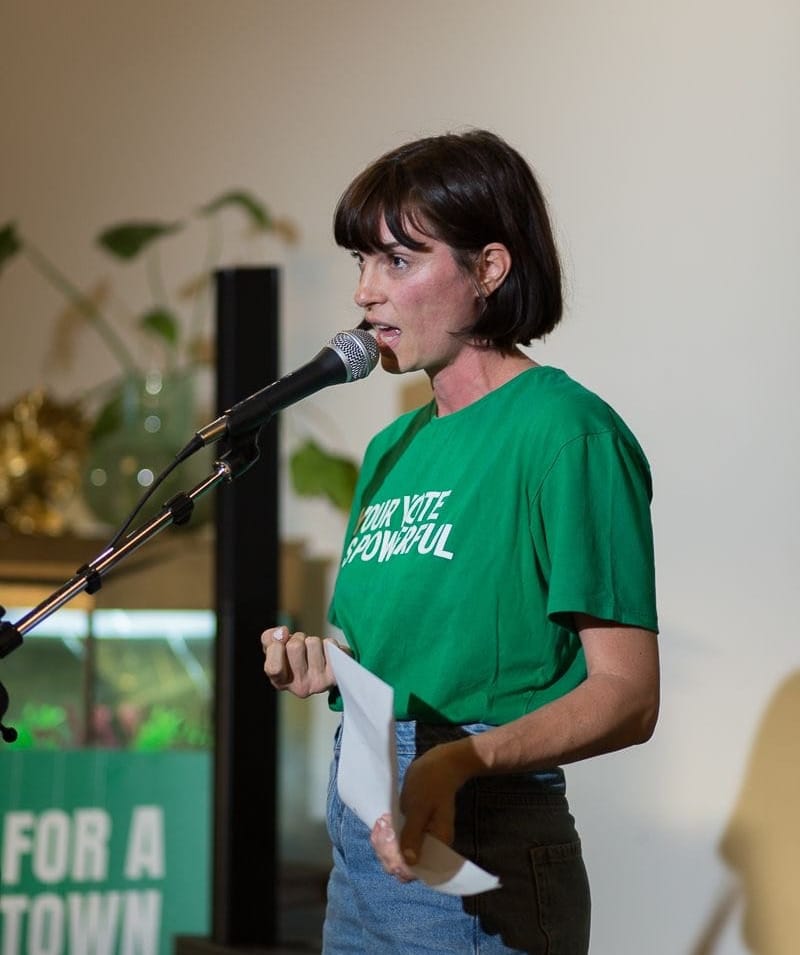
But it does seem that her campaign stopped short of articulating a full-throated critique of colonialism, or talking openly about police and prison abolition.
After the interview, I find myself regretting that I didn't make time to ask Asta more questions about her campaign's direct engagement with First Nations voters, and the contradictions of running for elected office in an illegitimate settler-colonial government. Those deeper questions definitely merit a longer conversation.
Asta acknowledges that although several of her campaign volunteers were First Nations, the Greens still have a long way to go in building meaningful engagement with Aboriginal residents of Mpwarntwe. She said some of her Greens-aligned First Nations colleagues were also active in supporting the independent council candidate and Arrente midwife, Cherisse Buzzacott, who appears to have secured just enough votes to be elected to the council alongside Asta.
That someone like Cherisse chose to run as an Independent perhaps reflects the fact that the Greens are still predominantly seen as a non-Indigenous political movement. But at least if Cherisse and Asta both end up part of a progressive block of councillors in Mpwarntwe, they may well have the clout to push back against some of the CLP's racism, even if the town is still stuck with a more conservative mayor.
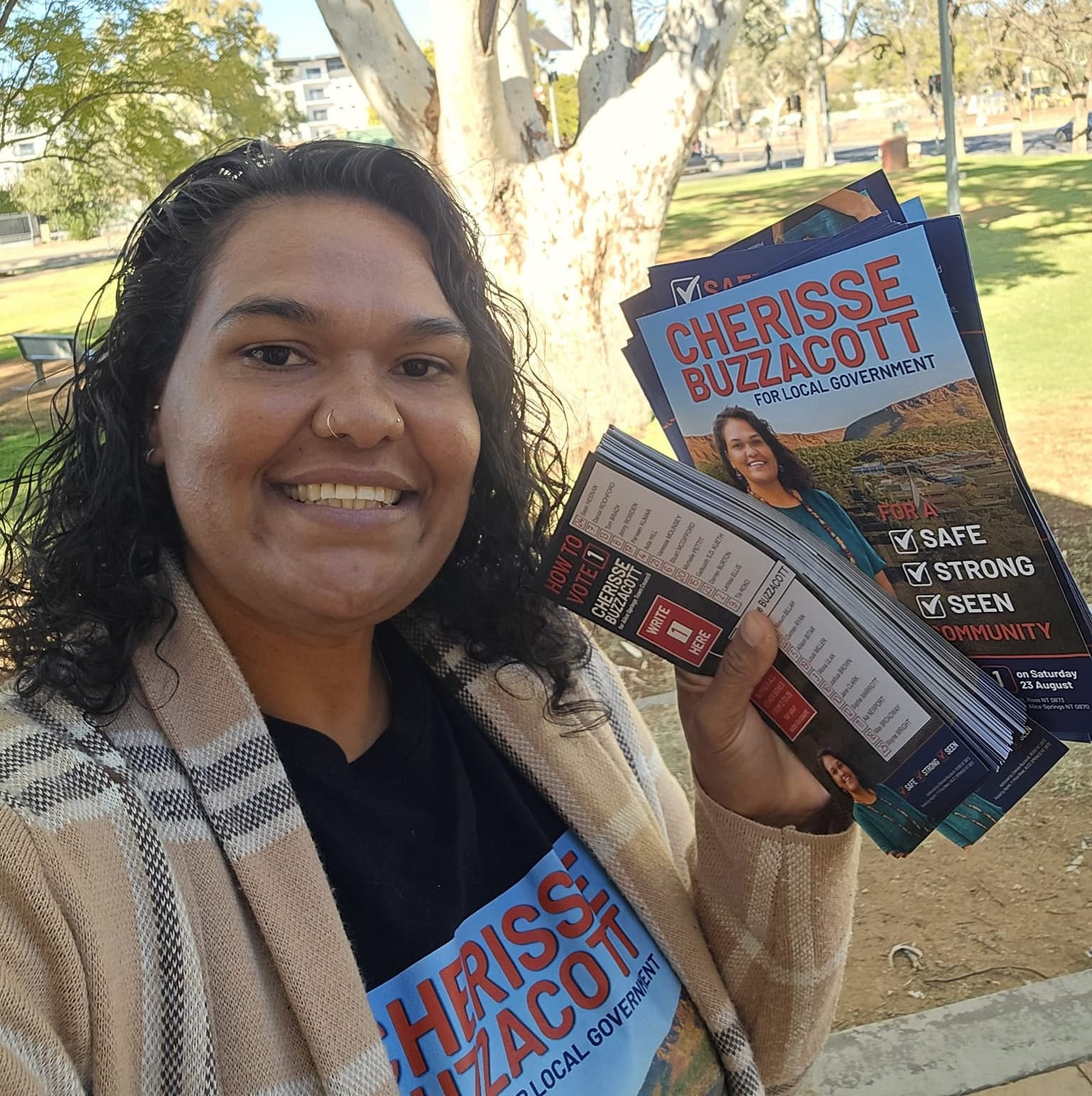
The blunt reality is that although almost 1 in 5 adults within the Alice Springs Town Council area are First Nations, voter enrolment rates are substantially lower among Indigenous communities. And turnout for local government elections is low across the board – out of the roughly 17 000 enrolled voters in Alice Springs, barely half voted in the August council election.
Low First Nations participation rates in elections mean there's less of a political cost to conservative politicians who scapegoat Aboriginal kids for all their town's problems. They can stoke the fears of racist non-Indigenous voters with impunity, knowing that a significant proportion of Indigenous residents won't even be voting.
But the fact that Alice Springs has almost elected a Greens mayor is a reminder that even in parts of the country that haven't historically been considered 'progressive,' you can run effective political campaigns that directly challenge racist fearmongering, rather than sidestepping it and hoping it dies away.
As well as its sizeable Aboriginal population, Mparntwe is also home to significant newer migrant populations. Census data suggests roughly 5% of residents were either born in India or are second-generation with Indian parents, while a further 3% are of recent Filipino ancestry. I suspect that just as seemed to be the case in Queensland, many of these voters would have been sucked in by the conservatives' anti-Indigenous fear campaign. But it makes me wonder whether there's potential to build a broader anti-racist coalition in towns like Alice that connects the experiences of non-Indigenous people of colour to First Nations concerns about land rights, over-policing and racialised exploitation.
Alongside the Greens' growth in the NT, non-partisan community groups like Justice Not Jails are continuing to resist the Country Liberal Party's racist agenda, centring and amplifying First Nations critiques of over-policing and racialised crime panics.
JNJ organises regular protests against the CLP government in Darwin and around the country, and is setting a powerful example for us activists on the east coast not to back down on this struggle between elections. It sounds like Asta is looking forward to continuing collaboration with Justice Not Jailes on this front.
Greens achievements in local government elections often don't attract much attention, but from my own experiences, I know that results like these can often lead to bigger shifts over time. A lot comes down to whether Greens reps actually use their platforms on local councils to push for systemic transformation, or are co-opted by these inherently conservative institutions and end up maintaining oppressive power structures rather than challenging them.
Asta's final words feel a little like cliche Greens optimism. I'll be interested to see how she's feeling after a few years in the often-thankless role of a local councillor. But they're still worth quoting...
"I just really hope that the experience here instills some hope in people... even when things are as frankly devastating as they are here [in the NT], there is so much scope for progressive change, and I really truly believe that comes down to connecting with your community, meeting them where they're at and offering them an alternative."

Thanks for reading! If you appreciate articles like this, and want to support more commentary and analysis of green politics, please consider signing up for a subscription...
You should also follow the work of Justice Not Jails and amplify their calls to action.
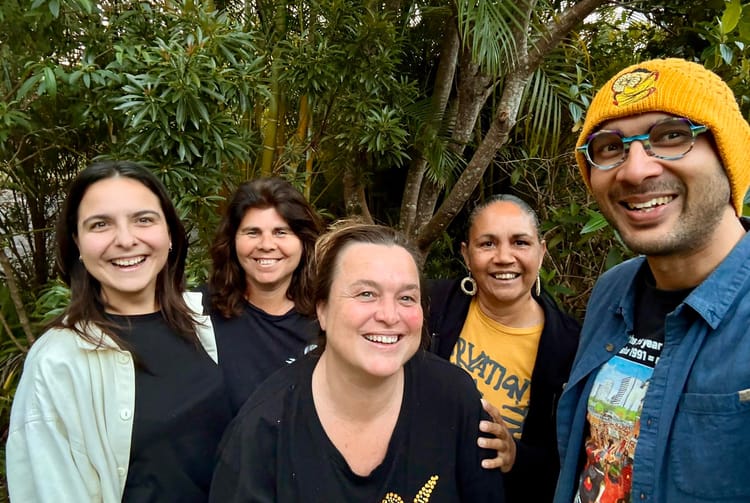
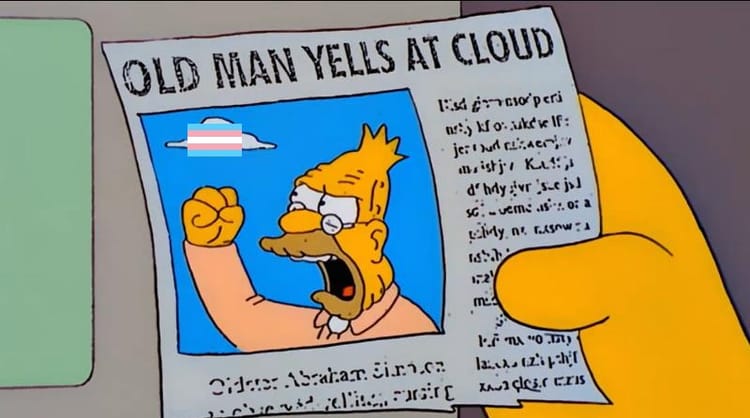
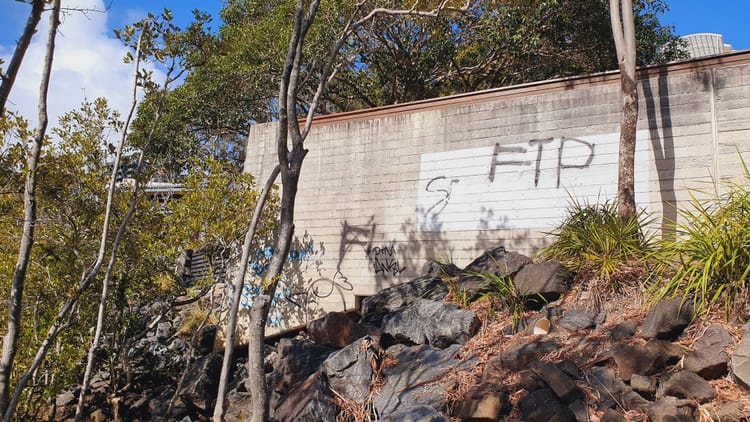
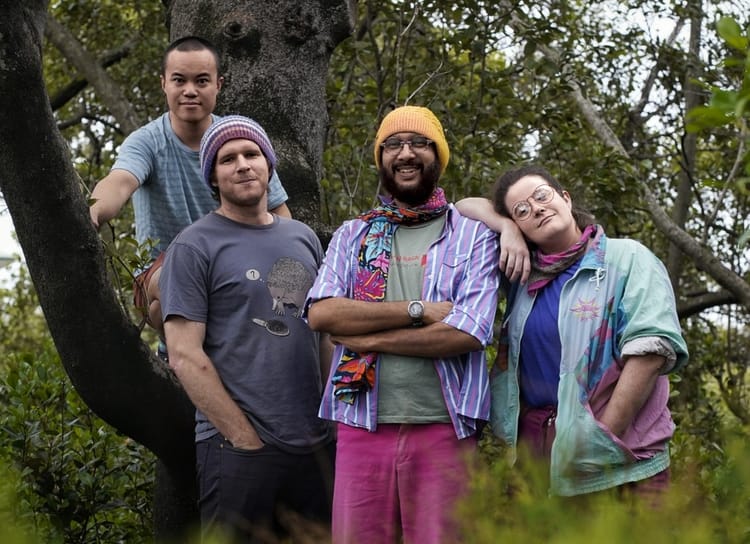
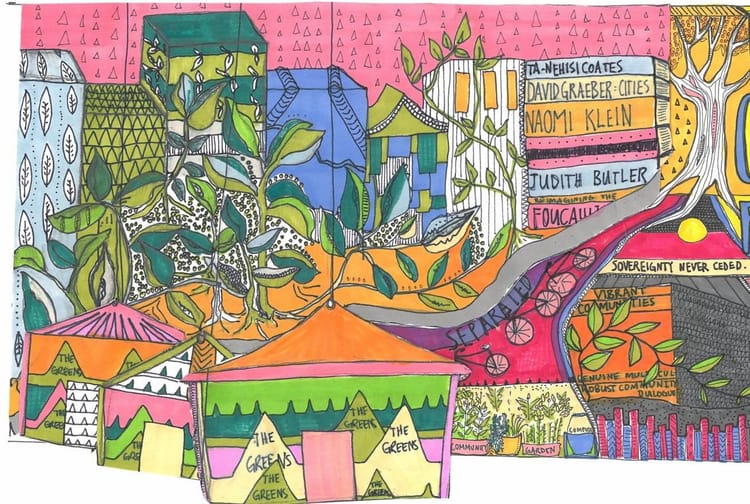
Member discussion